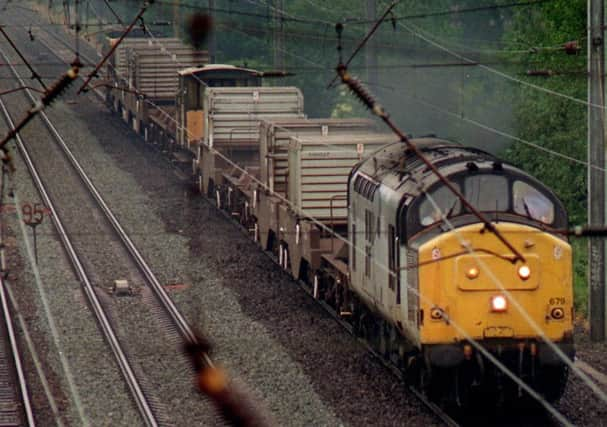Safety chiefs issue nuclear train reassurances


The company boss, who asked not to be named, raised his concerns after seeing trucks run through Wigan on weekday mornings sometimes up to four times a week depending on demand.
They are carrying spent radioactive fuel rods from nuclear power stations across the country up the West Coast Main Line to British Nuclear Fuels Limited’s Sellafield nuclear power station site in Cumbria for reprocessing.
Advertisement
Hide AdAdvertisement
Hide AdAlthough timetable information remains classified, experts say that there are now in excess of 1,000 nuclear waste train operations across the UK annually.
And with the boost in nuclear power confirmed by the Government last month, these are set to become ever-more frequent.
The businessman said rail trucks left him fearful every time he saw them pass through Wigan North Western station.
He was also concerned that nuclear trains were frequently held on a red signal for lengths of time approaching the station to allow faster passenger trains to pass.
Advertisement
Hide AdAdvertisement
Hide AdHe said: “Every time it goes through it makes me shiver and I am always relieved to see the back end of it disappearing out of Wigan.
“I don’t remember people along the route being consulted about any of this - and I think we should have been. They are passing within nine feet of passenger trains speeding past the other way.”
The used fuel is transported in special Used Fuel Flasks which are protective purpose built containers constructed to the strict performance guidelines of the Independent Atomic Energy Authority.(IAEA). The flasks ride on specially designed wagons configured for rail use which can also, should an emergency require, be hauled along a
road.
A spokesman for the IAEA, said: “In the unlikely event of an incident involving Defence Nuclear Material (DMN) the emergency services and local authority would activate generic multi agency emergency plans that are already in place to respond to any major incident.”
Advertisement
Hide AdAdvertisement
Hide AdThe trains were operated in accordance to UK legislation and Ministry of Defence policy.
She said: “The MoD maintains a capability to respond in the event of an emergency during the transport of Defence Nuclear Material.
“The response by the emergency services, health authority and local authority to a transport emergency will have much in common with the response to any major incident or emergency.”